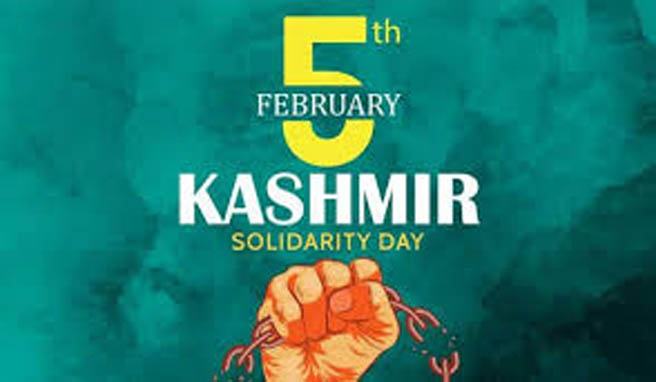
Online Desk: February 5th, observed as Kashmir Solidarity Day, is an annual reminder of Pakistan’s commitment to the Kashmiri people’s struggle for self-determination. Over the years, this day has carried immense symbolic value, bringing attention to the plight of Kashmiris under Indian occupation and asserting Pakistan’s moral, political, and diplomatic support for their cause.
For over seven decades, the people of Indian-occupied Jammu and Kashmir (IIOJK) have endured oppression under one of the most brutal and militarized regimes in modern history. The Kashmiri people’s cry for freedom resonates deeply in Pakistan, which shares not only geographical proximity with the region but also cultural, historical, and religious bonds. While this day has traditionally been a platform for voicing support for the Kashmiri cause, it is time to rethink its role and transform it into a cornerstone of year-round, actionable advocacy, keeping Kashmir at the center of Pakistan’s domestic and international efforts.
Our current approach, which often involves public holidays and ceremonial activities, falls short of creating the lasting impact needed to sustain global attention or foster a sense of ownership among Pakistanis. A day off may give an illusion of solidarity, but it does little to engage the public meaningfully with the issue. Instead, we need to reimagine February 5th as a starting point for year-round action. Imagine a day that not only highlights the injustices faced by Kashmiris but also galvanizes the entire nation into consistent, practical advocacy for their cause.
The government must begin by embedding the Kashmir narrative into the fabric of our educational and cultural systems. Rather than simply closing schools on February 5th, we should dedicate this day to hosting programs that educate students about the history, culture, and ongoing challenges of Kashmir. Schools and colleges can organize activities like debates, storytelling sessions, and exhibitions that instill in young minds a deep understanding of the issue. The youth must grow up with a sense of responsibility toward this struggle, recognizing Kashmir not as a distant political problem but as a personal and national cause.
Beyond education, February 5th should become a Launchpad for nationwide campaigns that continue throughout the year. Social media, one of the most powerful tools of the modern age, can be used to keep Kashmir at the forefront of global discussions. The government, civil society, and individuals should collaborate on producing content that highlights the Kashmiri struggle, from personal stories of resilience to artistic expressions of loss and hope. Instead of letting Kashmir fade from public consciousness after February 5th, we must make it an everyday narrative through innovative campaigns that reach both domestic and international audiences.






